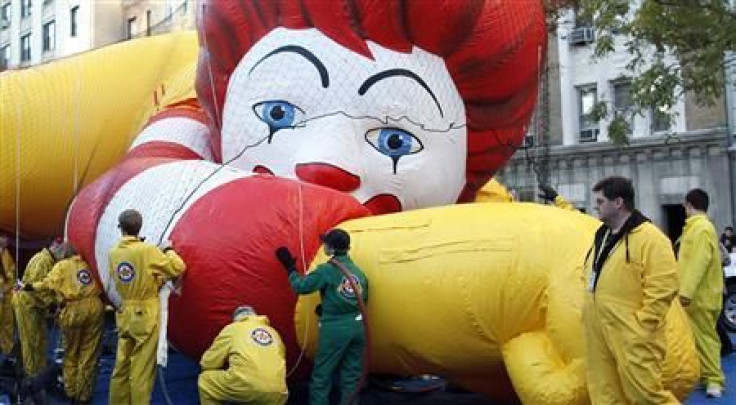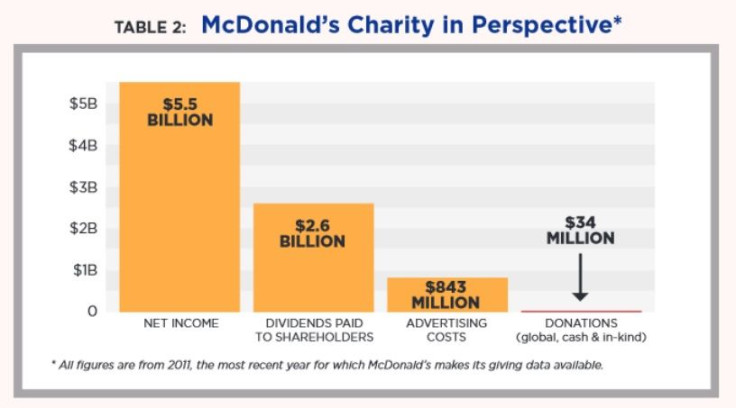McDonald’s Corp (MCD) Exploits Ronald McDonald House Despite Giving Scant Financial Support, Report Alleges

A group of health and consumer advocates want to bring down Ronald McDonald’s house of cards.
According to a scathing new report, McDonald’s Corp. (NYSE:MCD) has been exploiting its namesake philanthropic organization, the Ronald McDonald House Charities, for the purposes of furthering its global effort to market junk food to children. The report, released on Tuesday by the food-industry watchdog Eat Drink Politics, accuses the multinational burgernaut of allotting very few recourses to the charity, even as it reaps significant branded benefits from its philanthropic endeavors.
“In attaching the Ronald McDonald name to a vitally important charity, McDonald’s gains an emotionally loaded marketing vehicle while shielding itself from critics,” said Michele Simon, the study’s lead author, in a statement.
Simon, a public health lawyer and founder of Eat Drink Politics, authored the report in collaboration with Corporate Accountability International and the Small Planet Fund. Examining tax filings and audited financial statements, the researchers estimated that only about 20 percent of the charity’s revenue comes from McDonald’s Corp. itself. At the local level, that number is even lower, with local Ronald McDonald Houses receiving about 10 percent of their revenue from McDonald’s, including direct customer donations. As such, Simon said, local houses often resort to running disclaimers on their websites, explaining how little money they receive from the fast-food giant in hopes of encouraging their community members to give more. “[The] McDonald’s name is often a bigger liability than it’s worth,” Simon added.
In a strongly worded statement to International Business Times, Bridget Coffing, McDonald’s Corp.’s senior vice president of corporate relations, called the "report" (her quotation marks) “shameful” and “misleading.”
“We hesitate to even dignify it with a comment, but that would be a disservice to the McDonald’s employees, franchisees, suppliers and customers who have partnered tirelessly to support the tremendous work of Ronald McDonald House Charities (RMHC),” Coffing said. “This is a thinly veiled attack on our brand at the expense of the millions of families and organizations who have benefitted from RMHC. McDonald’s categorically rejects this self-serving and biased document and stands proud of the significant financial support and volunteer hours we have and will continue to provide to RMHC and other charities worldwide.”
According to the report, McDonald’s has a below-average track record of corporate giving. The company, the researchers say, gives only about 0.08 of its revenue to charitable causes, 33 percent below a six-year average measured by the Committee Encouraging Corporate Philanthropy. In contrast, individuals earning more than $50,000 donate 4.7 percent of their discretionary income to charity, a 14-fold increase over McDonald’s.

The Ronald McDonald House, first conceived as a children’s cancer foundation in 1974, comprises 290 chapters in 58 countries. The charity and its local chapters operate as independent 501 (c)(3) nonprofit organizations, although the charity shares office space and other expenses with McDonald’s at the company’s corporate headquarters in Oak Brook, Ill. The umbrella organization runs safe houses, medical-care units, scholarship programs and other initiatives designed to improve the well-being of children, according to its 2012 annual report.
While acknowledging the organization’s important charitable work, Simon said the Ronald McDonald House also acts as giant PR boost for McDonald’s Corp., whose public image has suffered in the wake of rising childhood obesity rates and other health problems linked to poor nutrition. At a time when McDonald’s Corp. is coming under increased scrutiny for marketing its nutritionally questionable food toward children, the charity offers its brand an opportunity for safe passage into schools and other areas populated by young people. Although McDonald Corp. has made a voluntary pledge not to market directly in schools, Simon’s report is peppered with photos of Ronald McDonald gland-handing with schoolchildren and appearing on local newscasts to promote outreach programs and other initiatives.
Questioning the appropriateness of branded charities in general, the researchers said they hope McDonald’s will consider changing the name of the Ronald McDonald House and retiring its red-headed mascot:
“As our research shows, very little of the important work to help children and families is funded by McDonald’s, and much of it relies on volunteers and donations from local communities. By associating its brand with Ronald McDonald House Charities, McDonald’s gives the false impression that the corporation is providing most, if not all, of the funding. McDonald’s gets the PR benefit of being closely associated with the branded charity without paying for it.”
A spokeswoman for McDonald’s did not immediately return a request for comment. Updates will be posted here.
Read the full report, “Clowning Around With Charity,” here.
Got a news tip? Email me. Follow me on Twitter @christopherzara
© Copyright IBTimes 2024. All rights reserved.












